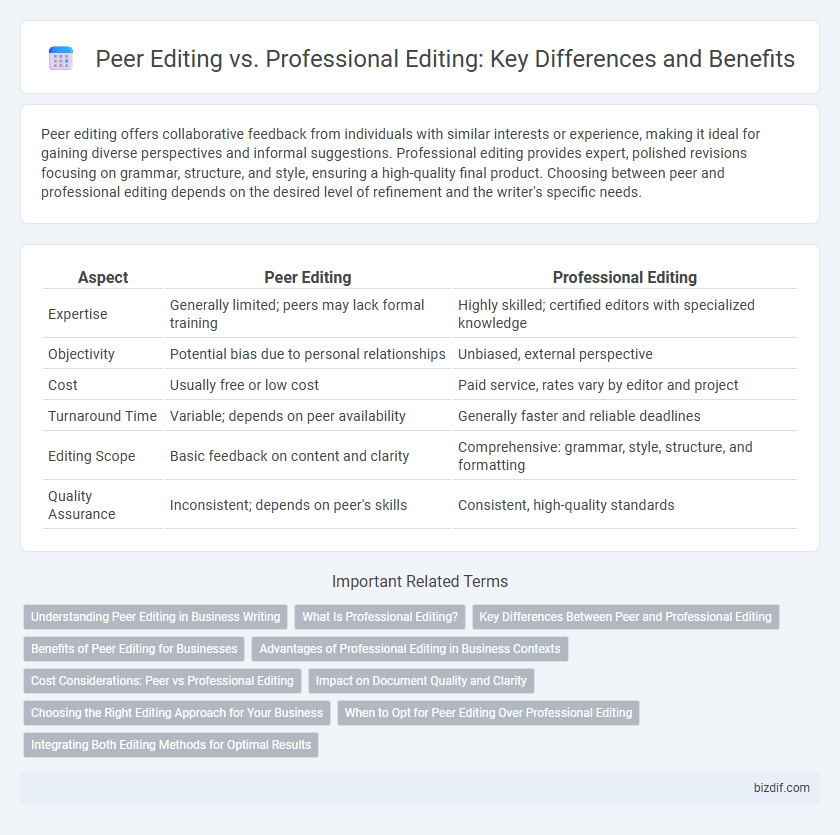Peer editing offers collaborative feedback from individuals with similar interests or experience, making it ideal for gaining diverse perspectives and informal suggestions. Professional editing provides expert, polished revisions focusing on grammar, structure, and style, ensuring a high-quality final product. Choosing between peer and professional editing depends on the desired level of refinement and the writer's specific needs.
Table of Comparison
| Aspect | Peer Editing | Professional Editing |
|---|---|---|
| Expertise | Generally limited; peers may lack formal training | Highly skilled; certified editors with specialized knowledge |
| Objectivity | Potential bias due to personal relationships | Unbiased, external perspective |
| Cost | Usually free or low cost | Paid service, rates vary by editor and project |
| Turnaround Time | Variable; depends on peer availability | Generally faster and reliable deadlines |
| Editing Scope | Basic feedback on content and clarity | Comprehensive: grammar, style, structure, and formatting |
| Quality Assurance | Inconsistent; depends on peer's skills | Consistent, high-quality standards |
Understanding Peer Editing in Business Writing
Peer editing in business writing fosters collaborative feedback, allowing colleagues to identify clarity issues, tone inconsistencies, and grammatical errors from a reader's perspective. This approach enhances communication effectiveness by leveraging shared understanding of industry-specific terminology and company culture. While it may lack the polish of professional editing, peer editing supports continuous learning and immediate improvements within teams.
What Is Professional Editing?
Professional editing involves a skilled editor who refines a document by improving clarity, structure, grammar, and style to meet industry standards. Unlike peer editing, which offers feedback from a fellow writer or colleague, professional editing provides expert, unbiased revisions ensuring polished, publish-ready content. This service often includes fact-checking, consistency correction, and adherence to specific style guides such as APA, MLA, or Chicago Manual of Style.
Key Differences Between Peer and Professional Editing
Peer editing offers collaborative feedback primarily from fellow writers or classmates, emphasizing developmental aspects such as content clarity and coherence. Professional editing involves skilled editors who provide in-depth corrections on grammar, structure, style, and formatting, ensuring publication readiness. Key differences include the level of expertise, objectivity, and the scope of editing tasks performed.
Benefits of Peer Editing for Businesses
Peer editing fosters collaborative improvement by leveraging diverse perspectives within a business, enhancing content accuracy and relevance at a lower cost compared to professional editing services. This approach encourages employee engagement and skill development, promoting a culture of continuous learning and quality assurance. Peer editing can accelerate turnaround times and increase internal communication efficiency, benefiting overall business productivity.
Advantages of Professional Editing in Business Contexts
Professional editing in business contexts ensures precision, consistency, and adherence to industry standards, which enhances the overall credibility and professionalism of corporate documents. Expert editors bring specialized knowledge that can identify and correct nuanced errors, improve clarity, and tailor content to target audiences, resulting in stronger brand communication and increased stakeholder trust. Utilizing professional editing services streamlines the review process, reduces costly revisions, and maximizes the impact of marketing materials, reports, and proposals.
Cost Considerations: Peer vs Professional Editing
Peer editing typically involves little to no financial cost, relying on colleagues or friends who exchange feedback voluntarily, making it a budget-friendly option for writers. Professional editing services demand higher fees, reflecting the editor's expertise, experience, and the comprehensive scope of services such as developmental, copy, or proofreading edits. Evaluating cost-effectiveness requires balancing the quality and depth of feedback against the budget constraints, especially for projects aimed at publication or professional distribution.
Impact on Document Quality and Clarity
Peer editing fosters collaborative feedback that enhances document clarity through diverse perspectives, often identifying contextual and stylistic inconsistencies. Professional editing provides expert-level refinement, ensuring grammatical accuracy, coherence, and adherence to industry standards, which significantly elevates overall document quality. Both methods improve clarity and quality, but professional editing delivers a polished, publication-ready text with nuanced language precision.
Choosing the Right Editing Approach for Your Business
Selecting the optimal editing approach depends on your business's goals, budget, and desired quality level. Peer editing offers cost-effective feedback and collaborative insights, ideal for early drafts and fostering team involvement, while professional editing guarantees expert, polished results suited for formal publications and critical documents. Evaluating project scope and audience expectations ensures your choice enhances clarity, accuracy, and overall impact.
When to Opt for Peer Editing Over Professional Editing
Peer editing is ideal during early drafting stages when feedback on general structure, clarity, and flow is needed from fellow writers or colleagues familiar with the subject. Choosing peer editing can be cost-effective and provides diverse perspectives, especially within academic or workshop settings where collaborative improvement is emphasized. Professional editing is more suitable for final drafts requiring expert attention to grammar, style, and consistency before publication.
Integrating Both Editing Methods for Optimal Results
Integrating peer editing and professional editing combines collaborative feedback with expert precision to enhance overall content quality. Peer editing fosters diverse perspectives and initial error detection, while professional editing ensures technical accuracy and adherence to style guidelines. Utilizing both methods maximizes clarity, coherence, and polish in the final draft.
Peer Editing vs Professional Editing Infographic

 bizdif.com
bizdif.com